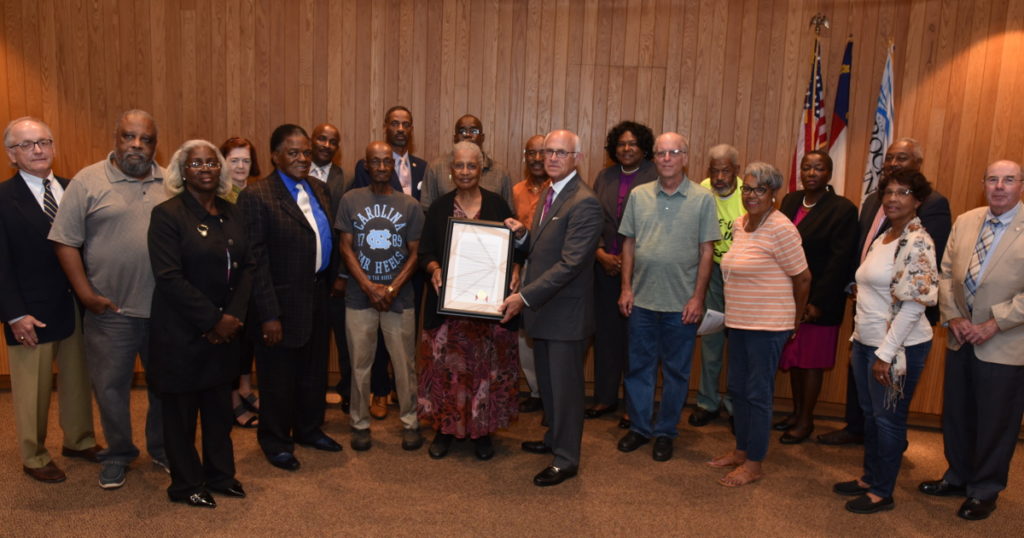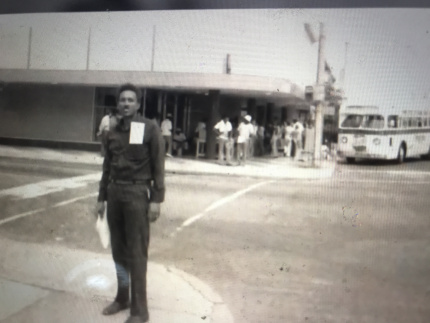In 1978, from July 10 to September 25, 1978 about 36 City of Rocky Mount Sanitation workers went on intermitting strikes demanding the rehiring of Alexander Evans a Sanitation workers that was unjustly fired for picking up a suit left by a trashcan that was emptied by workers. There was policy that anything left within 10 feet of trash can be picked up by the workers. Evans was known to take clothes to people in need as part of his religious mission. A week before being fired there was an article in the Rocky Mt newspaper honoring Evans for caring for the poor. These workers were not unionized, but acted collectively to send representatives to meet with the City Manager and community forces to build support.

The City prosecuted Evans in court and was defeated, but the City wouldn’t rehire Evans, so the workers went on strike again.
There was an important history of Black Community and labor struggle in Rocky Mt that shaped the political climate that led to the Rocky Mount City Council passing a resolution in October 2018 apologizing to the Sanitation workers for the actions of the 1978 City Council, the erection of a Highway Marker in the City in October 2018 recognizing the 1978 Strike, and in Nov 2019, the City Council voted unanimously to pay the 36 workers and their families if no longer living $1,000 each. The hourly wages were $3.15 an hour or $126.00 a week. This amount is based on one weeks pay, doubled with interest.

This struggle and the outcome as part of an ongoing struggle is a form of restorative justice, an aspect of the demand for reparations.
The 1978 Strike took place during a period when Rocky Mt had an at-large electoral system that denied citizens the right to elect Council members from the wards they live in. This gave the City’s white majority at that time the ability to elect all representatives to the City Council and appoint heads of all departments. In 1978, there was only one Black City Councilman.
As the Striker’s built community support, Evans and Naomi Green, a leader of the Welfare Rights Organization and strong supporter of the Strike began pointing out in meetings that the lack of Black political representation on the Council denied a level of Black political power to contest unjust decisions and policies that deny equal rights to Black Communities and Black workers.
This represented the beginning of a turning for the struggle for Black political power in Rocky Mt. In 1981, Black Workers for Justice (BWFJ) was formed out of a struggle against racial discrimination at K-mart against 3 Black women workers. This struggle built worker and Community support similar to the 1978 Sanitation workers struggle and was promoted by the Concerned Citizens Coalition that supported the 1978 Strike.
Alexander Evans became the first Chairperson of the Rocky Mt Chapter of BWFJ in 1982. In 1983, three BWFJ members and 2 members of the local Welfare Rights Organization became plaintiffs of a voting rights lawsuit that challenged and defeated the Rocky Mt At-large voting system resulting in the election of 3 Black Council members and by the mid 1990s when the city became a Black majority 4 Blacks were elected to the Council.

This history and the connections of the struggles and their political meaning was researched, developed and presented through educational forums by the Phoenix Historical Society. The Society is a worker and community based institution led by a leader of the Carolina Auto and Aerospace Workers Union a division of the NC Public Service Workers Union UE Local 150 that BWFJ members helped to organize in 1997.



